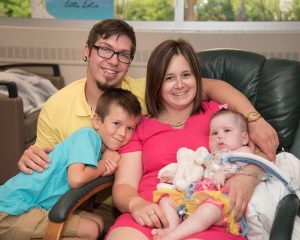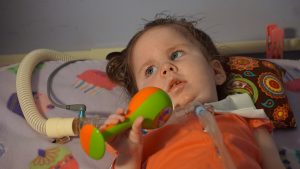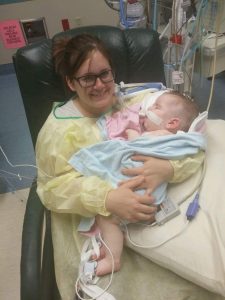The fight of Lilah’s young life is against government – without medicine, she will die

Lilah with her mom Nicole, dad Eric and brother Carter. Photo courtesy: Nicole Lamont
“She was not able to move her legs. She just flopped like a cooked spaghetti.”
SMA is a rare neuromuscular disorder characterized by loss of motor neurons and progressive muscle wasting, often leading to early death. It manifests in various degrees of severity. Proximal muscles, arm and leg muscles that are closer to the torso and respiratory muscles are affected first. Other body systems may be affected as well, particularly in early-onset forms of the disorder. SMA is the most common genetic cause of infant death.
Twice, severity of the disease has pushed Lilah close to death. She is now surviving on a medication available in 22 countries but Canada is struggling for the access. These drugs are so expensive that many parents who need it go bankrupt.
Nicole Lamont is fighting to get subsidized medicine for her daughter, Lilah, against the provincial government.
Their journey has been a roller coaster ride.
“I was 23 years old when I was carrying Lilah. It was a wonderful experience. I enjoyed every moment,” says Nicole.
“On the way to the hospital, we actually ended (up) blowing a tire on the side of the road and we had to pull over and I was labouring on the side of the road.”
Family and friends visited Nicole and Lilah at the hospital.
“I fell in love with her when I held her,” says Nicole’s childhood friend, Danielle O’Keefe.
After their one month check-up, the pediatrician said Lilah had a weak cough.
Instead, her health started deteriorating.

Lilah playing in the afternoon at home on April 3, 2018. Photo by Shubhangana Vishwanathan
After noticing Lilah was losing her appetite and not moving at all, Nicole and her husband Eric rushed their daughter to a hospital in Windsor. Lilah was there for two weeks.
“We kept being told that she was fine. It was Hypotonia, she would go for therapy one day.”
Hypotonia, commonly known as floppy baby syndrome, is a state of low muscle tone (the amount of tension or resistance to stretch in a muscle), often involving reduced muscle strength..
A ,shadow was spotted on her X-ray. Nicole remembers being told by the doctors.
“That spot was just a shadow from her heart,” she recalls.
Lilah started turning blue.
“We weren’t comfortable going home,” says Nicole.
Lilah’s condition was getting worse with time.
Lilah’s parents did not feel comfortable with the doctor’s diagnosis,” We fought with the doctors to send her to Victoria hospital in London, Ont. instead.”
“(After) half an hour of being in London, they found out that shadow on her X-ray was not her shadow of her heart. It was her partially collapsed lungs,” says Nicole.
Lilah was close to dying. In the next 12 hours, both her lungs collapsed.
“That’s when our seven month stay in ICU started and she was also diagnosed two weeks after that,” says Nicole.
The hospital did a genetic test for Lilah to identify the markings for SMA.
It is the leading cause of genetic mortality in children younger than two years old. It affects one in 11,000 live births. In 95 per cent of cases, SMA is caused by homozygous deletion of the SMN1 gene. In addition, all patients possess at least one copy of an almost identical gene called SMN2.
“We have struggled with misdiagnosis in Windsor,” says Nicole.
Nicole and Eric were left infuriated. She recalls of having hard time walking in that hospital.
“There is a hospital that doesn’t have expertise or knowledge of this … She could have been a bit stronger for a bit longer if we would have got the help that we needed to begin with,” says Nicole.
Her eyes brimming in tears she says, “Just heartbreaking that my own city that I lived in (didn’t) recognise this and catched it on time.
After Lilah was admitted to the ICU, doctors gave her IV lines and breathing tubes.

Nicole with Lilah. Photo courtesy: Nicole Lamont
Nicole and Eric were seeing different doctors everyday with many appointments.
“As soon as the neurologists and genisist saw her, they knew right away that it was SMA.” Doctors educated about SMA told Nicole “life expectancy would be grave.”
“She just lost lots of muscle and I don’t know how to explain what happened when we got that news. It’s the hardest thing that a parent has to go through,” says Nicole.
Lilah was diagnosed with SMA when she was just five months old and doctors said she would not make it to her first birthday. Nicole is in tears remembering hearing this news for the first time.
“My husband and I took a couple of days to process the news and then we did some research to find out if there was anything else that could be done.”
At that time, Nicole and Eric were not able to find any medical trial that could have helped.
“(We just needed to) enjoy the time we had with her because at that point it wasn’t very long we were going to have her with us,” says Nicole.
Nicole and her husband didn’t know how to communicate to the family.
“I actually sent a group text message to everybody and sent it to all our family and friends and put it on Facebook,” says Nicole.

Eric with Lilah. Photo courtesy: Nicole Lamont
“We probably might not answer your calls right now and we just need our time,” she recalls writing in the Facebook message.
Doctors told the couple that Lilah would keep losing muscle movements every day and they were going to try to take out the breathing tube to see if Lilah could survive.
But Lilah was not able to breathe and was getting more sick without the tube. They had to put the tube back so she could be stable.
The second time the doctors took out the breathing tube and put Lilah on the machine was during a process called biPAP (non-sensitive motted ventilation). Lilah could only survive for two and a half days.
“We almost lost her again on that day,” says Nicole. “We were asked to decide whether to go with the tracheotomy and ventilator, or as I say, pull the plug and let nature take its course.”
Nicole and Eric decided to go with the tracheotomy. The preparations began.
Lilah underwent the surgery of tracheotomy.
Nicole and Eric wanted to start a new life. On August 4, 2016, Eric proposed to Nicole.
“Lilah was wearing a cute onesie shirt which says, ‘Will you marry my daddy’ and I couldn’t say no.”
Eight weeks later, they got married at the hospital chapel.

Eric and Nicole getting married on October 1, 2016. Photo courtesy: Nicole Lamont
“We made sure that Lilah and Carter were part of it,” says Nicole.
Nicole and her bridesmaids got ready at the Ronald McDonald House in London.
“They had chocolate dipped strawberries in for us and all the nurses in the hospital decorated Lilah’s room … They had little distilled water bottles and made a ‘just married’ sign on it. So it was very special.”
After the wedding, Nicole was told by the doctors that a special access program was opening and they could enroll Lilah for Spinraza.
“It was one of the holidays and one of the neurologist came in one day and told us that Lilah was being accepted in a special access program and she was going to receive Spinraza,” says Nicole
Lilah was the first one to receive Spinraza in Canada.
After this medication, Lilah was able to sustain a better life even though it doesn’t give a full cure to this disease. The Biogen Company opened an access program for all Type 1.
Biogen now covers the $750,000 cost of first-year treatments, as well as the $350,000 cost of each subsequent year. But the coverage could end if the provincial government approves the recommendation by The Canadian Agency for Drug and Technology in Health (CADTH).

Nicole holding Lilah for the first time after diagnosis of SMA in London hospital. Photo courtesy: Nicole Lamont
The agency has filed a request to the provincial government stating that the access program for Type 1 SMA (kids like Lilah) should be discontinued. It recommends covering the medication for the youngest SMA patients and who have the most severe form of SMA Type 1.
Lilah has Type 1, but because her disease has progressed, she now also needs a breathing tube. CADTH recommends covering the medication for the patients who are not currently requiring ‘invasive ventilation.’
Nicole and Eric were devastated when they heard their daughter wouldn’t qualify under agency recommendations.
“I (ran) outside and I screamed at the top of my lungs, you know? And I just dropped to the floor,” says Nicole.
The company is now making negotiations with the pan-Canadian Pharmaceutical Alliance (p CPA) which brings all the provinces together to negotiate the prices on drugs.
“Any parent can go bankrupt but it’s about their children and we cannot live like that,” says Eric. “I feel that the Canadian government cannot measure price and a life.”
“Don’t give my granddaughter a death sentence or any other child,” says Lilah’s grandmother, Kristen Nicoletti.
Eric fears what might happen if the accessibility of drugs are limited.
“(Lilah) can lose her movements and we might end up losing her as Spinraza is just a treatment and not the cure,” says Eric.
Now, Nicole and Eric have started organizing events to create awareness regarding Spinraza and also to raise money for SMA. The funds will be used towards the Cure SMA Canada organization and Lilah’s treatment if the recommendations are accepted by provincial government.
Both Nicole and Eric are ready to overcome any challenge for their daughter.
“No matter how high the wall is, there is always a ladder to climb,” says Eric.


